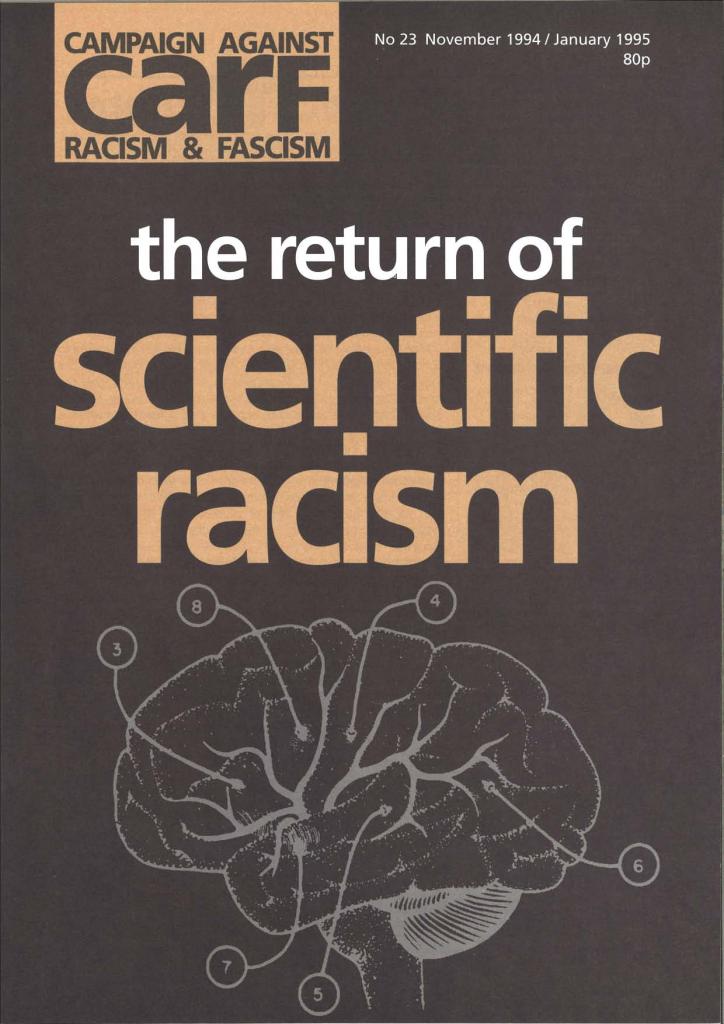by Alexandra Fair
Each of the three meetings of the London Conference on Intelligence (LCI) were secretive affairs. Organized by University College London lecturer Dr. James Thompson between 2015 and 2017, the conference was invitation-only. Despite efforts to conceal the event and subsequent “disputes that eugenics was a major theme of these conferences,” the London Conference on Intelligence was a lightning rod for modern day eugenic thought. The release of University College London’s internal report on the LCI in February 2020 reveals the depth of this connection and exposes how eugenic ideas of old drive modern ethnonationalism.
A team of university investigators compiled the 110 page report on the conference and cautioned readers that only conference participants could be “certain” of what occurred in its closed meetings. The swaths of material redacted from the report to protect “large amounts of personal information” do little to aid understanding of the event. Outside observers must rely on the internal report’s “verbal accounts” and an appendix containing “publications relating to the London Conference on Intelligence” to evaluate the conference. Taken together, Thompson’s commentary and supporting literature from Mankind Quarterly link the London Conference on Intelligence to a eugenic network where the Pioneer Fund reigns supreme.

Established in 1937 to finance the education of children “descended predominately from white persons” and to “study and research into the problems of heredity and eugenics,” the Pioneer Fund was a rallying point for ideological extremes. Its earliest projects included the distribution of a Nazi propaganda film titled Erbkrank under the English translation Applied Eugenics in Present Day Germany. [1] In later years, Pioneer Fund financed research provided “intellectual” cover for everything from 1960s era American segregationist movements to 1970s era British fascist movements.
Faced with hard-won civil rights gains in the U.S., the Pioneer Fund funded White Citizens’ Council initiatives including a radio broadcast titled the Citizens’ Council Forum as early as 1959. Founded in July 1954, the White Citizens’ Council was driven by its unashamed opposition to Brown v. Board’s integration decree. Given the breadth and clarity of its resistance, financial contributions to the White Citizens’ Council were financial contributions to segregation. The Pioneer Fund’s financial support for segregationists became collaborative in 1961 when Pioneer Fund grantee Carleton Putnam addressed Citizen Council members on “Race and Reason Day” in Jackson, Mississippi. Standing in the Olympic Room of the Heidelberg Hotel, Carleton Putnam outlined a series of pro-segregation theories for an audience of Citizens’ Council supporters on an October afternoon, including a diatribe against “intermarrying.” A perennial tool of segregationists, Pioneer Fund research reached a transnational audience with the formation of the National Front.
Later, 1970s era British fascist groups including the National Front utilized Pioneer Fund research to underwrite their own prejudice. The National Front formed in 1967 with an electoral platform that opposed immigration and efforts to “destroy” the British Empire. Eugenics was a frequent topic of debate in National Front publications. In particular its magazine Spearhead, cited numerous Pioneer Fund grantees in an attempt to bolster its claims about racial difference in intelligence. In 1976, Spearhead went so far as to describe Pioneer Fund grantee Arthur Jensen’s research as “the most important factor in the build-up of self confidence among ‘racists.’”[2] Time and time again, the Pioneer Fund subsidized research that advanced eugenic theories about racial difference to actively undermine racial equality.

For decades, Pioneer Fund grantees honed these ideas in the pages of a journal called Mankind Quarterly. Established in 1960 by the International Association for the Advancement of Ethnology and Eugenics (IAAEE) with Pioneer Fund money, the journal published numerous articles on eugenics. Pioneer Fund grantees were frequent contributors whose articles covered topics ranging from eugenic social policies to alleged racial difference in crime statistics.
Alongside these intellectual connections, Mankind Quarterly also relied on the Pioneer Fund for financial support. Its first editor, Scottish anthropologist Robert Gayre, received grants annually between 1962 and 1972 from the Pioneer Fund “as a token of appreciation for your scientific efforts during the past year.”[3] Pioneer Fund support for Mankind Quarterly was not limited to its editor. Associate editor and IAAEE member Henry E. Garrett also received annual subsidies for his research on purported racial differences in crime rates to resist civil rights gains. Over the years, editorial control of Mankind Quarterly shifted from the IAAEE to anthropologist Roger Pearson’s Institute for the Study of Man and later to psychologist Richard Lynn’s Ulster Institute for Social Research. These academics and the research institutes they supervise all had one benefactor in common: the Pioneer Fund.
Today Mankind Quarterly is published by the Ulster Institute for Social Research under the direction of Pioneer Fund director Richard Lynn. Though the Ulster Institute neutrally bills itself as “a think tank for the support of research on social issues and the publication of works by selected authors in this field,” it is a haven for eugenic thought. Several of the publications available for purchase on its website cleave to eugenic ideas about racial difference in intelligence. Other anthologies memorialize late Pioneer Fund directors. These publications reflect the close intellectual association between the Ulster Institute and the Pioneer Fund.

The relationship between the Ulster Institute and the Pioneer Fund is not only intellectual. A cash flow also links the two organizations. The Ulster Institute received at least $50,000 from the Pioneer Fund in 1994 for research on nutritional intake and IQ scores that presumed racial differences in intelligence. At the same time these ideas were well-publicized in Charles Murray’s controversial book The Bell Curve. Though Murray’s book did not receive Pioneer Fund money, its then director commented “We’d have funded Murray at the drop of a hat but he never asked.” More recently, the Pioneer Fund’s 2015 tax records list the Ulster Institute on its schedule of contributors for a sum of $1,000. These financial ties facilitate the creation and distribution of contemporary eugenic literature.
In this milieu, Mankind Quarterly remains an organ for modern day eugenic thought. Contributors such as Kevin Lamb are steeped in white nationalist movements and assert “the significance of eugenics in contemporary society.”[4] Other Mankind Quarterly authors explicitly use eugenic ideas about the heredity of intelligence to bolster assertions about racial difference. London Conference on Intelligence participant Emil Kirkegaard is one such author. Kirkegaard’s 2019 article “First Names, Cognitive Ability and Social Status in Denmark” claims that people with “western” first names are more intelligent than “non-western, Muslim names.”[5] In both cases, contributors advocated a form of genetic determinism that presumed race, intelligence and other traits were genetically foreordained. Given Mankind Quarterly’s frequent endorsement of these eugenic ideas, the journal’s inclusion in the London Conference on Intelligence papers belies the claim that “eugenics was not a major theme of the conference.”
The use of Mankind Quarterly articles to direct the academic program for the London Conference on Intelligence was no accident. Several authors had their own connections to the Pioneer Fund. Richard Lynn, whose research on “sex differences in intelligence” inspired many of the articles attached to the UCL report, is the current director of the Pioneer Fund. Fellow participant Gerhardt Meisenberg was also a director of the Pioneer Fund and the editor in chief of Mankind Quarterly in 2018. But the connections do not stop there.
Numerous authors included in UCL’s report on the London Conference on Intelligence are also connected to the Ulster Institute for Social Research. Author Edward Dutton is one of few who listed the Ulster Institute as his academic affiliation. Additionally, Dutton sits on the advisory board of the Ulster Institute which supports Mankind Quarterly. Still other authors including Helmuth Nyborg and conference organizer James Thompson also hold positions on the academic advisory council of the Ulster Institute. Given the Ulster Institute’s commitment to disseminating eugenic texts, it once again appears that numerous participants in the London Conference on Intelligence (LCI) elsewhere advanced eugenic thought. Whether LCI participants devoted their intellectual energy to Mankind Quarterly’s advisory board, to the Ulster Institute for Social Research or both, they drew upon entities connected to the Pioneer Fund for their intellectual community.

The appendix of “listed presenters” (image 1) included in University College London’s investigation into the London Conference on Intelligence is entirely redacted. Beneath the title, the page is nothing more than a large black square. Certainly it does not name the Pioneer Fund as a source of intellectual inspiration for the conference. Yet Pioneer Fund influence abounded in the conference literature and in the financial history of the Ulster Institute with which multiple conference attendees are affiliated. Amidst this web of connections with the Pioneer Fund at the center it is increasingly clear than eugenic was indeed “a major theme of these conferences.” While the phrase “eugenics” appeared infrequently in the redacted report on the London Conference on Intelligence, its intellectual production was steeped in eugenic thought.
These connections are the reason, as author Angela Saini put it “eugenics refuses to die.” Past British political advisors openly advocated “progressive eugenics” while insisting such policies would be voluntary and altruistic. For its part, the Trump Administration’s non-response to the Coronavirus pandemic is its own “eugenic vision” that jeopardizes essential workers and economically vulnerable people. However they are phrased, eugenic ideas about innate racial difference actively undermine racial equality. Given these examples of modern eugenics, good science and good conscience require an understanding and bipartisan rejection of eugenics by any name.

Alexandra is a 2019-2020 Fulbright scholar at the University of Reading where her dissertation examines eugenic ideology in post-WWII Britain. Her other research interests include African American history and reproductive justice history. During the 2018-2019 academic year, she was a Research Fellow at the Consortium for the History of Science, Technology, and Medicine (CHSTM). She holds an M.A. in History from Miami University (Ohio) and her work has been published in Black Perspectives and Paedagogica Historica. You can follow her on Twitter @alexandrakfair.
Further Reading
[1] Nancy Ordover, American Eugenics: Race, Queer Anatomy and the Science of Nationalism (Minneapolis: University of Minnesota Press, 2003), 44-46.
William H. Tucker, The Funding of Scientific Racism: Wickliffe Draper and the Pioneer Fund (Urbana and Chicago: University of Illinois Press, 2002), 219. Certificate of Incorporation of the Pioneer Fund (February 27, 1937) on file with Department of State, State of New York
[2] Michael Billing, Fascists: A Social Psychological View of the National Front (London: Academic Press, 1978), 144.
[3] Tucker, The Funding of Scientific Racism, 73.
[4] Kevin Lamb, “In Defense of Eugenics,” Mankind Quarterly vol. 42 no. 2 (Winter 2001): 181-187.
[5] Emil O Kirkegaard, “First Names, Cognitive Ability and Social Status in Denmark,” Mankind Quarterly vol. 59, no.4 (October 2019).


Pingback: Superiori: l’intreccio tra scienza e potere al servizio dei teorici della razza – Query Online
Emil Kirkegaard is a white nationalist
https://rationalwiki.org/wiki/Emil_Kirkegaard
LikeLike